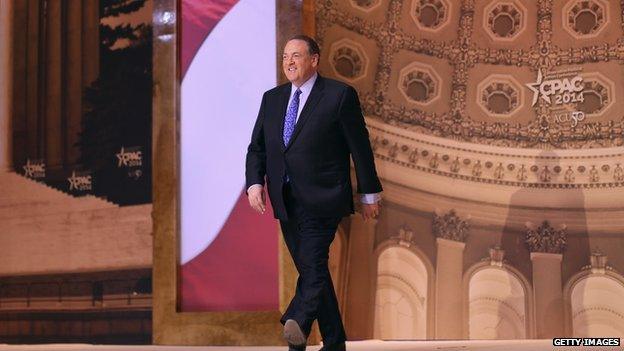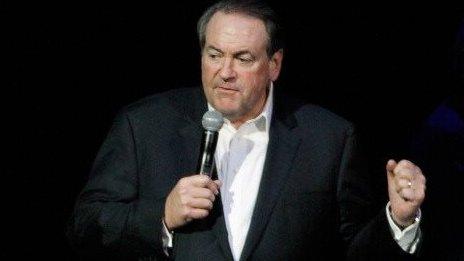Former Governor Mike Huckabee hints at 2016 presidential run
- Published

A review of the best commentary on and around the world...
Today's must-read
It's looking increasingly likely that former Arkansas Governor Mike Huckabee is going to seek the Republican presidential nomination, writes, external the Washington Examiner's Byron York. And if polls, external in Iowa, which holds the first-in-the-nation caucuses, are any indication, he should be considered an early favourite.
"Few frontrunners choose not to run," York writes. "And when Huckabee, not yet a candidate and officially undecided, invited a group of reporters to meet with him at a hotel outside Washington Monday, he certainly looked like a man preparing to jump into the race."
York recounts how Mr Huckabee spent an inordinate amount of time talking about foreign affairs in general and Israel in specific - criticising President Barack Obama's handling of the Middle East.
"The conversation wasn't a tour d'horizon of foreign policy, but it was clear Huckabee has been studying up - for a former governor steeped in domestic policy, often a sign of an impending run," he says.
Since his 2008 campaign for the Republican nomination, in which he finished second to John McCain, Mr Huckabee has spent most of his time as a popular television host and commentator. The visibility, and financial war chest, that his media enterprises have provided, York says, would give him the ability to launch a serious candidacy.
National Journal's Ron Fournier agrees, external with York's take on Huckabee's ambitions. He asked the former governor why 2016 would be different from the last time he ran.
"He's not a creature of Washington and he is a favourite of social conservatives, a preacher-turned-politician who won the Iowa caucuses in 2008 before running out of steam," Fournier writes. "Should he choose to run in 2016, Huckabee said the path would be easier. He is better-known, battle tested and already drawing the interest of major donors."
Name recognition, money and experience running in the harsh spotlight of a national campaign - those are the types of attributes that in the past have chalked up delegates and secured presidential nominations.
Scotland
Bitcoin could be a virtual national currency, external - In the lead up to Thursday's Scottish referendum, some critics have worried that the fledgling nation would not risk economic ruin without a reliable currency.
Those who see the choices as staying with the pound, adopting the euro or creating a weak new currency are missing a fourth option, writes Ben Myers, chief analyst at YesOption.com - Bitcoin.
"The exciting prospect of Scotland adopting Bitcoin would leapfrog its financial system ahead of other developed nations and increase the credibility and adoption rate of Bitcoin," he argues.
The Scottish have experimented with alternative currencies in the past, he notes, as in the 18th and 19th centuries some of the region's banks issued their own legal tender that circulated alongside the pound.
Rwanda
The legacy of 9/11, external - The terrorist attacks of 11 September 2001, were a wake-up call for the US, writes Kenneth Agutamba for the New Times, but many African nations had been confronting terrorism for years.
Although the 9/11 attacks were tragic, Agutamba continues, they changed the West's perspective and brought greater support for African nations battling militants.
"When a problem affects the US, it receives international prominence, and that's how terrorism became a global problem," he writes.
Thanks to Western support, he concludes, popular Rwandan President Paul Kagame is able to make good on his promise to "go after any fellow, anywhere, who attempts to hurt Rwandans and destabilise Rwanda".
Venezuela
An undeserved UN Security Council seat, external - According to an Associated Press report, the Latin American and Caribbean nations in the UN have agreed to elect Venezuela as their representative to the UN Security Council.
According to Christopher Sabatini, senior director of policy at Americas Society/Council of the Americas, following through with this decision would be a serious mistake.
Venezuela, he writes for US News & World Report, "has failed to meet the most basic conditions for membership including the institutional and political capacity to establish the essential national consensus to pursue Security Council decisions, the economic capacity to pursue and support council commitments and the political will and capacity to implement its decisions, which presumably include the protection of human rights".
Sweden
The rise of the far right, external - In Sweden's recent national elections, the right-wing anti-immigration Sweden Democrats garnered a surprising 13% of the vote, preventing any of the traditional power blocs from having enough seats to form a governing coalition.
The rise of the Sweden Democrats, writes University of Colorado Nordic studies Prof Benjamin R Teitelbaum, is a "nightmare for a vast majority of Swedes, who see their cherished reputation for civilised politics challenged by the nativism of the far right and an increasing tendency on the far left to fight back with vicious personal attacks and a measure of violence".
As tensions between the far-right party and their opponents grow, he writes in the New York Times, the values that Swedes have long treasured - "their homogeneity, egalitarianism and tolerance" - are at risk.
BBC Monitoring's quotes of the day
Global commentators offer their take on the upcoming Scottish independence referendum.
"The Scottish referendum has reflected the unravelling of the West's unifying ability. The rise of new countries is slowly changing the West's sense of superiority, and this may damage the foundation of the West's social stability." - Editorial in China's Huanqiu Shibao, external.
"UK Prime Minister David Cameron can expect one of two things: The first option is that Scotland becomes independent, in which case Mr Cameron's political death will be at hand. If the second option - the continuation of England and Scotland's union - is chosen, Mr Cameron will be chided over the spending in recent months on various English parties [supporting union between England and Scotland]." - Commentary by Alireza Sadeqi in Iran's Resalat, external.
"The people of Scotland will on Thursday conduct a referendum that would determine the political fate of their country. If the result of the voting is the independence of Scotland then that would be a major historic event by all means, not only in Britain alone but in Europe and the world." - Editorial in Pan-Arab al-Quds al-Arabi, external.
Have you found an interesting opinion piece about global issues that we missed? Share it with us via email at echochambers (at) bbc.co.uk.
- Published24 January 2014
